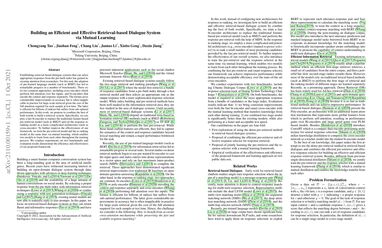Building an Efficient and Effective Retrieval-based Dialogue System via Mutual Learning
Establishing retrieval-based dialogue systems that can select appropriate responses from the pre-built index has gained increasing attention from researchers. For this task, the adoption of pre-trained language models (such as BERT) has led to remarkable progress in a number of benchmarks. There exist two common approaches, including cross-encoders which perform full attention over the inputs, and bi-encoders that encode the context and response separately. The former gives considerable improvements in accuracy but is often inapplicable in practice for large-scale retrieval given the cost of the full attention required for each sample at test time. The latter is efficient for billions of indexes but suffers from sub-optimal performance. In this work, we propose to combine the best of both worlds to build a retrieval system. Specifically, we employ a fast bi-encoder to replace the traditional feature-based pre-retrieval model (such as BM25) and set the response re-ranking model as a more complicated architecture (such as cross-encoder). To further improve the effectiveness of our framework, we train the pre-retrieval model and the re-ranking model at the same time via mutual learning, which enables two models to learn from each other throughout the training process. We conduct experiments on two benchmarks and evaluation results demonstrate the efficiency and effectiveness of our proposed framework.
PDF Abstract
